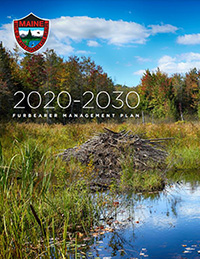Home → Fish & Wildlife → Wildlife → Species Management Plans → Species Management Plans → Maine's Furbearer Management Plan
Maine's Furbearer Management Plan

The Maine Department of Inland Fisheries and Wildlife (MDIFW) initiated comprehensive species planning in 1968 and have refined and expanded the process with each planning update. In 2017, MDIFW completed a major update of its management plans for big game species (deer, bear, moose, and wild turkey). In 2019, MDIFW began updating management plans for furbearer species, a diverse group that includes coyote, red and gray fox, bobcat, fisher, marten, raccoon, skunk, short and long-tailed weasel, mink, otter, beaver, muskrat, and opossum.
In 2019, MDIFW contracted with Responsive Management, an internationally recognized public opinion research firm, to obtain public input regarding the management of furbearers in the state. The study’s objectives were to determine public knowledge of furbearers, attitudes toward trapping, and human-wildlife conflicts of Maine’s residents, hunters, trappers, and landowners. The project gathered input from thousands of Maine residents. Specifically, Responsive Management conducted a scientific survey of Maine residents, hunters, trappers, and landowners; focus group discussions with residents, hunters, trappers, and animal rights advocates; regional public meetings open to the public; and an online discussion forum that allowed for additional input from Maine residents and recreationalists. Check out the Human Dimensions of Furbearer Management in Maine summary report (PDF) or the complete report (PDF).

The Furbearer Management Plan (PDF) will guide the management of Maine's 16 species of furbearers through 2030. The Plan is organized into a general introduction, a section summarizing statewide issues and management strategies that applies to all furbearer species, and separate chapters for Beaver/Otter, Mink/Muskrat, Coyote/Red Fox/Gray Fox, Bobcat, Marten/Fisher, and Raccoon/Skunk/Opossum/Weasel/Red Squirrel. Species chapters include sections describing ‘History and Population Status’, ‘Current Regulatory Authority’, ‘Current Management Issues and Threats’, ‘Goals and Strategies’, and ‘Expected Outcomes’.
Steering Committee
MDIFW convened a steering committee to help guide the overall planning process and species subcommittees to provide recommendations for the management of furbearer species. Species have been grouped based on similar management strategies with the following timelines to develop a species plan: Beaver/Otter (2019/20), Mink/Muskrat (2019/20), Canids (2020/21), Bobcat (2020/21), Marten/Fisher (2021/22), and other furbearers (2021/22).
The steering committee is lead by small mammal biologist Shevenell Webb and wildlife special projects coordinator Bob Cordes.